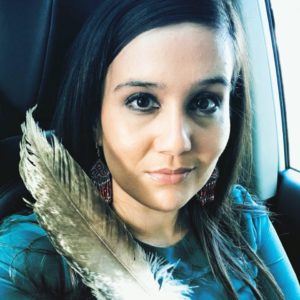A display of racial stereotyping witnessed in adolescence inspired Maulian Dana’s lifelong pursuit of indigenous rights and representation.
By Maulian Dana
February/March 2018 | view this story as a.pdf
 My name is Maulian Lorraine Dana, and I’m excited to have this chance to share the experience of a Penobscot Nation tribal citizen in Maine. “Maulian” is the English name “Maryann” spelled in Penobscot–we do not have the letter “r” in our language, so it’s replaced by an “i.” Having a unique tribal name in a state not known for its diversity has been an interesting experience, to say the least. I have the same middle name as both my maternal and paternal grandmothers, each strong pillars of the community. Both have held directorial and elected positions in the Penobscot community for my entire life. My last name is a strong connection to my ancestors. Many different families of Danas have inhabited these sacred lands for countless generations, and I carry the name with pride and humility in all of my work.
My name is Maulian Lorraine Dana, and I’m excited to have this chance to share the experience of a Penobscot Nation tribal citizen in Maine. “Maulian” is the English name “Maryann” spelled in Penobscot–we do not have the letter “r” in our language, so it’s replaced by an “i.” Having a unique tribal name in a state not known for its diversity has been an interesting experience, to say the least. I have the same middle name as both my maternal and paternal grandmothers, each strong pillars of the community. Both have held directorial and elected positions in the Penobscot community for my entire life. My last name is a strong connection to my ancestors. Many different families of Danas have inhabited these sacred lands for countless generations, and I carry the name with pride and humility in all of my work.
I was raised on Indian Island, the Penobscot Nation Reservation where I now own a home and raise my two daughters. I have the honor of being the first-ever appointed Ambassador for our nation. I serve as a representative to municipal, state, and federal governments, as well as doing education and outreach on a variety of civic and social issues. I work closely with the other tribal governments in Maine: the Passamaquoddy tribes of Sipayik and Indian Township, the Maliseet tribe of Houlton, and the Micmac tribe of Presque Isle. We’re all stand-alone sovereign nations with our own history and culture, but we come together to unite as the Wabanaki Confederacy–the “People of the Dawn.”
I became interested in the rights of indigenous people when I was a teenager. I was watching the high school basketball tournaments with my father, Barry Dana, who was the Chief of the Nation at the time. The game was between the Nokomis Warriors and the Skowhegan Indians. When half-time came, the cheerleaders and band came out to perform. Both teams were dressed in fake buckskin outfits, neon-colored “war paint,” and feathers from a craft store. They were all making the hand-over-mouth chant you might see in old westerns when the Indians were on the warpath. I turned to my father enraged. “Is this what people think of us? This is not OK!” A fire was lit in me that day to protect what was sacred to me. I’d been raised to respect and turn to my culture and cultural identity in times of self turmoil or discrimination from others. In the stands were kids my own age and their parents mocking my religion and heritage. In that moment, I was set on my path as an activist to change these mascots in Maine and beyond. My reaction was not a political correctness crusade on ignorant but well-meaning people cheering for a team; these displays incite dangerous thought patterns that lead to racist and sometimes violent behavior against the marginalized target group. I turned that anger into motivation. Wells High School uses “Warriors” with culturally-offensive imagery, and the Skowhegan Indians remain the only “Indian” mascot in the state. The work continues, but the 20 or so schools that have made the changes over the years give me hope.
After graduating from the University of Maine Orono with a degree in Political Science, I knew I wanted to use my knowledge and my passion for progressive social change to help my people. I was elected to the tribal council, a 12-person governing board that reports to the Chief, in 2016. A year later, I was offered the Ambassadorship. I’m truly blessed to be chosen as the Tribal Ambassador and carry with me both my ancestors’ hopes and my descendants’ dreams in all I do. Woliwoni naka mesintalnapemak. Thank you and all my relations.






0 Comments